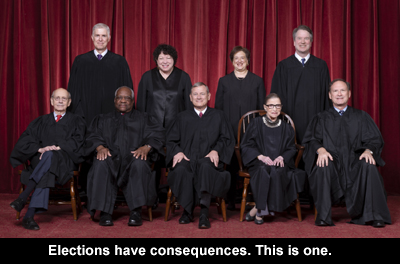While you were looking over there, this week the Trump administration set the wheels in motion to lock-in a structural electoral advantage for white people and conservatives for the next generation. They argued before the Supreme Court in favor of including a citizenship question on the 2020 Census, challenges to which have been upheld by lower courts, and it looks pretty promising for them, based on comments from the bench. A decision in favor of the administration would be very bad news for any hope of not only electoral and policy victories in the short term, but also equitable distribution of services and resources in the years and decades to come, so this is probably literally the most important story in the country this week, and the coverage has been relatively cursory.
The fact is, there is already a slanted playing field, tilted toward the Republican party’s core constituencies, regardless of what Trump claims. Just look at what happened in 2016. For the second time in four presidential election cycles, a GOP candidate won the presidency with an electoral majority and a popular vote minority, only this time, the discrepancy between the two results was far greater than it was in 2000. The 2016 election was 304 Trump to 227 Clinton in the electoral college, but 48.2% Clinton to 46.1% Trump in the popular vote – a nearly 3 million vote plurality. Gore’s popular vote margin of victory in 2000 was one-tenth the size, but he only lost the electoral college by 4 votes (271 Bush to 266 Gore). Not a positive trend, and the story in the Senate is very similar – outsized influence on the part of white voters in more rural regions has us gradually drifting towards a persistent GOP majority. (Don’t even get me started on gerrymandering.)

The Census case before the Supreme Court is potentially the final nail in the coffin of progressive hopes for some recovery from the losses we’ve suffered over the past decade. As I’ve said previously, elections have consequences – namely, a solid reactionary majority on the Supreme Court, an increasingly reactionary bench in the lower courts, the undermining of voting rights, reproductive rights, immigrant rights, environmental policy, you name it. Activism is vital, crucial, particularly as it relates to ground-level organizing, but we cannot neglect a progressive electoral strategy – one that both strives to move the country in a more leftward direction, while at minimum reducing harm to the most vulnerable populations.
We failed in the latter respect in 2016, particularly, losing our last chance to steer the Supreme Court in a new direction. We must fight on, but the road ahead is steeper than it was before.
luv u,
jp

 Lest you think I’m unfairly blaming Bush II, just consider – most Supreme Court vacancies occur according to plan. To the greatest extent possible, a justice now plans his/her (usually his) exit based on the likelihood that his/her successor will be appointed by a president who shares the Justice’s general political orientation. (Hence Justice Sandra Day O’Connor’s reported election night 2000 angst over the apparent election of Al Gore.) That pattern was disrupted in 2005, when illness compelled Chief Justice William Rehnquist to step down. Had Bush not been re-elected the year before, John Kerry would have nominated Rehnquist’s replacement and the political balance of the court would very likely have shifted to the center-left for perhaps the next generation. Instead, thanks to Dubya, we have Citizen’s United, McCutcheon v FEC, and now Hobby Lobby, Harris v Quinn, and McCullen.
Lest you think I’m unfairly blaming Bush II, just consider – most Supreme Court vacancies occur according to plan. To the greatest extent possible, a justice now plans his/her (usually his) exit based on the likelihood that his/her successor will be appointed by a president who shares the Justice’s general political orientation. (Hence Justice Sandra Day O’Connor’s reported election night 2000 angst over the apparent election of Al Gore.) That pattern was disrupted in 2005, when illness compelled Chief Justice William Rehnquist to step down. Had Bush not been re-elected the year before, John Kerry would have nominated Rehnquist’s replacement and the political balance of the court would very likely have shifted to the center-left for perhaps the next generation. Instead, thanks to Dubya, we have Citizen’s United, McCutcheon v FEC, and now Hobby Lobby, Harris v Quinn, and McCullen.